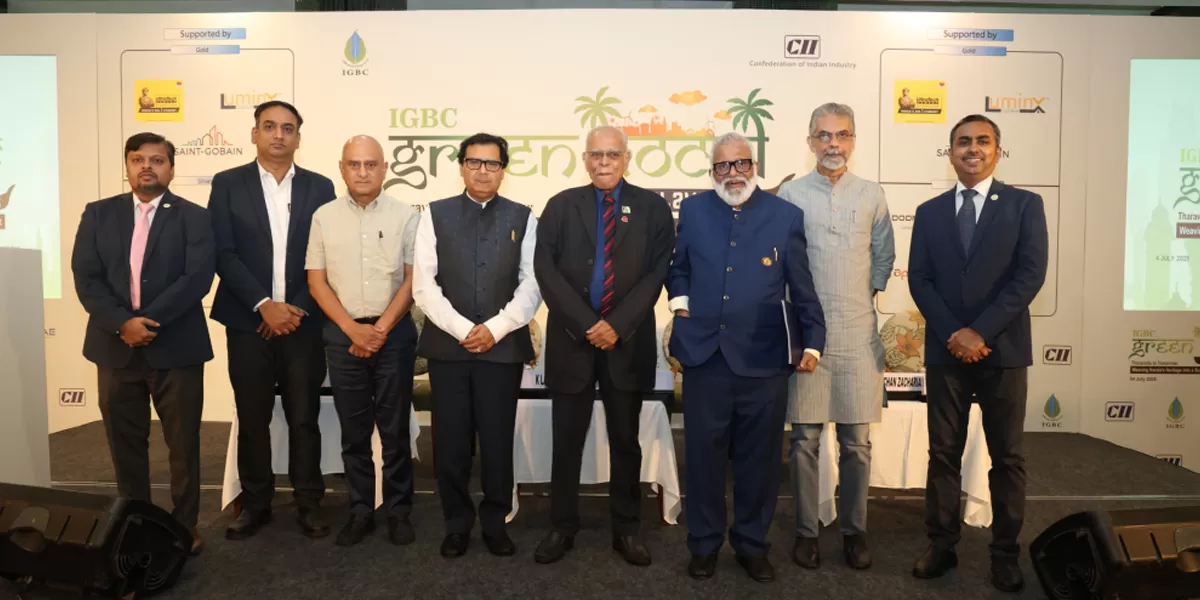The Indian Green Building Council (IGBC), part of CII, hosted the Green Kochi Conclave 2025 on 4 July at Hotel Holiday Inn, Kochi, under the theme “Tharavadu to Tomorrow: Weaving Kerala’s Heritage into a Sustainable Built Environment.” The event brought together policymakers, architects, developers, and thought leaders to discuss Kerala’s progress in blending cultural heritage with sustainable design.
Kerala is emerging as a frontrunner in climate-resilient development, thanks to passive design strategies, rainwater harvesting, cool roof initiatives, and the widespread adoption of solar energy. With institutional backing, public-private partnerships, and growing awareness, the state is steadily building a culturally rooted, low-carbon future.
Kerala currently has over 460 IGBC-registered green building projects covering 49 million sq ft across sectors. Key platinum-rated projects include Kochi Metro Rail Ltd, RBI Kochi, Kannur International Airport, IOCL’s Calicut office, and Club Mahindra Ashtamudi. Shoba City in Thrissur is Net Zero Water-certified, while Lulu Mall Thiruvananthapuram and Vismayam have received Gold ratings.
The conclave opened with addresses by V Suresh, Chairman, Policy Advocacy & Government Relations, IGBC; Joseph Michael Kallivayalil, Vice Chairman, CII Kerala State Council; Ar B R Ajit, Past Chairman, IGBC Kochi Chapter; K Lava, Chairman, IGBC Kochi Chapter; Ar Lalichan Zacharias, Co-Chair, IGBC Kochi Chapter; and M Anand, Deputy Executive Director, IGBC.
In his keynote, V Suresh said,
“With 13 states across India offering policy incentives for IGBC-certified green buildings, Kerala is setting a strong example by providing up to 50 per cent reduction in one-time building tax, 1 per cent reduction in stamp duty, and 20 per cent reduction in property tax. These measures reflect the state’s proactive approach to sustainable development. I encourage all stakeholders to participate in the IGBC Green and Net Zero Building Movement and help shape a greener, climate-resilient India.”
Joseph Michael Kallivayalil added,
“Kerala is steadily advancing its green building movement. The growing adoption of sustainable practices reflects the state’s commitment to reducing environmental impact and enhancing quality of life through energy-efficient, resource-conscious design. The IGBC Kochi Chapter plays a vital role in this progress through active awareness campaigns, stakeholder engagement, and collaborations such as its partnership with the Kerala Infrastructure Investment Fund Board (KIIFB) to promote green infrastructure across the state.”
K Lava welcomed the dignitaries and stated,
“The Green Kochi Conclave 2025, themed ‘Tharavadu to Tomorrow’, brings together key stakeholders to chart a greener future for the state. Supported by the Government of Kerala, the event highlights the role of green technologies, Net Zero buildings, and eco-friendly infrastructure in addressing climate challenges and urban growth. Kochi, as a coastal city, is positioned as a model for sustainable urban development.”
In a panel discussion on Resilient Kerala: Integrated Strategies for Water, Energy and Waste, R Harikumar, Director, Energy Management Centre, Government of Kerala, highlighted the state’s climate-conscious development strategies. The event also showcased success stories from Kochi Metro and Cochin International Airport, both pioneers in scaling up green practices.
M P Ramnavas, Director (Projects), Kochi Metro Rail, participated in the panel “Accelerating Kerala’s Green Transition” and discussed how transit infrastructure can drive climate-resilient urban growth. Mr Manu G, Airport Director, Cochin International Airport Ltd (CIAL), shared the airport’s sustainability journey. CIAL is recognised as the world’s first fully solar-powered airport.
In his closing remarks, Ar Lalichan Zacharias said,
“The Green Kochi Conclave 2025 sets the stage for a collective push towards sustainable urban development in the state. It brings together policymakers, professionals, and partners to explore practical solutions and innovations in green building, resource management, and climate resilience. With Kochi as the focal point, the conclave emphasises the importance of preserving cultural identity while advancing environmentally responsible growth.”
Panel discussions explored topics such as ESG-aligned development, net-zero buildings, green finance, heritage-sensitive architecture, and sustainable hospitality. The event provided a platform for collaboration between developers, consultants, manufacturers, and government bodies.
The conclave saw participation from over 20 experts across construction, planning, and infrastructure sectors. Industry leaders from organisations such as Saint-Gobain, UltraTech, Lulu Tech Park, and Asset Homes shared insights on sustainable innovation.
The event was supported by key industry bodies including CREDAI Kerala, Indian Institute of Architects (Cochin), IIID, and ISHRAE, and was sponsored by UltraTech Cement, Saint-Gobain, LuminX, Doors & More, Simpolo, and Asian Paints.
As Kerala undergoes rapid urbanisation, the conclave closed with a call to action—urging all stakeholders to accelerate the transition towards inclusive, energy-efficient, and climate-resilient built environments rooted in the state’s cultural identity.





















